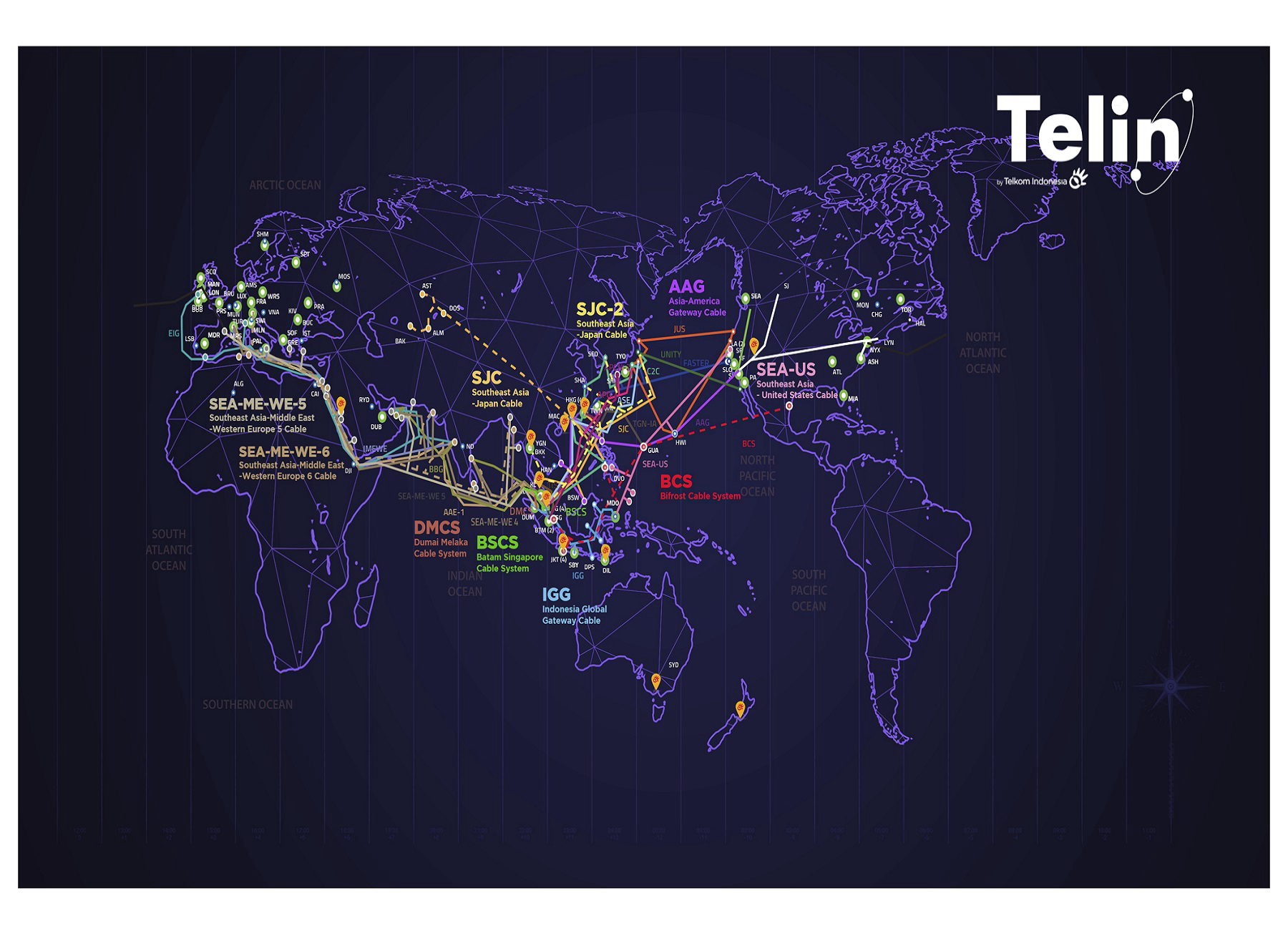 Photo caption: Map of submarine cable communication system or SKKL (Dok. Telin).
Photo caption: Map of submarine cable communication system or SKKL (Dok. Telin).
Jakarta, 24 June 2022 - Following its success in deploying a submarine cable to the United States in 2017, TelkomGroup through its subsidiary Telin and the Bifrost consortium will deploy a new submarine cable communication system (SKKL) in collaboration with Meta/Facebook and Keppel. The Bifrost SKKL development is strategic since it will strengthen Manado's 2nd International Gateway.
Telin President Director Budi Satria Dharma Purba said the Bifrost SKKL route will also serve as a diversity/redundancy landing point where the IGG and Bifrost will have different landing points. In addition, it will provide support for connectivity availability to the new national capital Nusantara. Bifrost SKKL routes are Jakarta, Singapore, Balikpapan, Manado, Davao, Guam, and California.
"Telkom Group through Telin has built 70 thousand kilometers of SKKL, in addition to ownership collaboration in various other international SKKLs reaching more than 200 thousand kilometers stretching from Indonesia, the Asian Region, the Middle East, to the United States," Telin President Director Budi Satria Dharma Purba said in Jakarta, Friday (24/6).
Meanwhile, SVP Corporate Communication & Investor Relations of PT Telkom Indonesia (Persero) Tbk (Telkom) Ahmad Reza said Telkom became the first operator to build a submarine cable communication system that connects Indonesia/Southeast Asia directly to the United States. Telkom through the SEA-US Submarine Cable consortium and the Indonesia Global Gateway (IGG) kicked off the SKKL construction in 2014 and the project was completed in 2017.
IGG is a consortium between Telkom and Telin, while SEA-US is an international consortium consisting of Telin, Globe Telecom, GTA, Hawaiian Telcom, RTI, and GTI. The two SKKLs have been operating since 2017 serving national customers and hyperscalers and serving IP Transit (2nd Gateway International Manado).
Ahmad Reza added that the IGG SEA-US submarine cable stretches from Singapore to Indonesia and to the United States. It connects five areas and territories, namely Manado (Indonesia), Davao (Philippines), Piti (Guam), Oahu (Hawaii, USA), and Los Angeles, California (USA). The SEA-US and IGG deployment is an alternative route that passes through Indonesian waters and the Pacific sea. It serves also as protection for cable routes to America, which generally go through the Luzon Strait and the South China Sea/Luzon Strait, where the cable is often severed due to underwater earthquakes and ship anchors.
“This has resulted in the IGG and SEA-US routes being the most popular routes and there is an increasing customer demand for these routes. Currently, there are many submarine cable systems developments and constructions that follow this route,” Reza said.
To further strengthen the existing submarine cable communication system and establish connectivity in eastern Indonesia, Telkom Internasional (Telin) has been constructing the Bifrost SKKL since March 2021, joining a global telecommunications consortium which counts Telin, Keppel, and Meta as its members. According to Ahmad Reza, Bifrost SKKL directly connects Indonesia to the United States with Manado as the second international gateway in Indonesia after Batam, to support the development in the eastern region of Indonesia.
“The Bifrost SKKL development that TelkomGroup pioneered is very strategic for Indonesia's comprehensive connectivity and it supports the digital economy that is estimated to reach 4,500 trillion rupiah in 2030. The Bifrost SKKL will also serve as a backup should there be any severed or disrupted SKKLs. It also provides connectivity to the under-construction, new national capital Nusantara," he said.
#DigitalBisa
#UntukIndonesiaLebihBaik